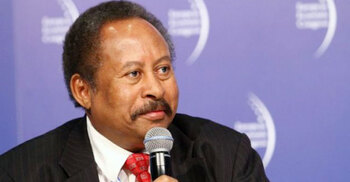Sudan anti-coup protest death toll rises to 40

Sudanese anti-coup activists have called for mass protests on Sunday, as medics said the number of people killed since last month’s military takeover has risen to at least 40 after a teenager shot in the head days earlier died.
Sudan’s top general Abdel Fattah al-Burhan on October 25 declared a state of emergency, dissolved the interim government and arrested the civilian leadership.
The military takeover upended a two-year transition to civilian rule, drew wide international condemnation and punitive measures, and provoked people to take to the streets.
Protests on Wednesday led to the deadliest day so far, with the toll of those killed after those protests now standing at 16, according to medics.
“One martyr passed away … after he succumbed to severe wounds after being hit by live rounds to the head and the leg on November 17,” the independent Central Committee of Sudanese Doctors said on Saturday. He was aged 16, it added.
Most of those killed on Wednesday were in North Khartoum, which lies across the Nile River from the capital, medics said. Hundreds have also been wounded during the crackdown, according to the committee.
Police officials deny using any live ammunition and insist they have used “minimum force” to disperse the protests. They have recorded only one death, among demonstrators in North Khartoum.
On Saturday, pro-democracy activists made online calls for mass anti-coup protests with a “million-strong march on November 21”.
‘Abuses and violations’
On Friday, small groups of protesters rallied in several neighbourhoods after prayers against the military coup, especially in North Khartoum, where people were seen building barricades across the roads. Security forces sporadically fired tear gas to disperse them.
The United States on Friday condemned the deadly crackdown.
“We call for those responsible for human rights abuses and violations, including the excessive use of force against peaceful protesters, to be held accountable,” State Department spokesman Ned Price said in a statement.
Washington said Sudanese should “be free to voice their opinions without fear of violence”, and called for those arrested since the takeover to be freed.
“In advance of upcoming protests, we call on Sudanese authorities to use restraint and allow peaceful demonstrations,” the US added.
Other international condemnation over Wednesday’s crackdown included comments by the United Nations High Commissioner for Human Rights Michelle Bachelet, who described the use of live ammunition as “utterly shameful”.
The European Union also condemned the crackdown, saying that the telecommunications blackout must “not prevent the world from being informed about these human rights violations”.
A day later on Thursday, the official news agency SUNA said internet and telephone services were “gradually returning through all telecommunication companies” following weeks of a near-total shutdown.
Meanwhile, the Sudanese Professionals Association (SPA) have urged protesters to keep up their campaign, reporting on Friday that security forces had “stormed homes and mosques” in North Khartoum.
The SPA is an umbrella of unions which were instrumental in the months-long demonstrations that toppled president Omar al-Bashir in April 2019.
Sudan has a long history of military coups, enjoying only rare interludes of democratic rule since independence in 1956.
Al-Burhan, the top general, insists the military’s move “was not a coup” but a step “to rectify the transition” as factional infighting and splits deepened between civilians and the military under the now-deposed government.
He has since announced a new civilian-military ruling council in which he kept his position as head, along with a powerful paramilitary commander, three senior military figures, three ex-rebel leaders and one civilian.
But the other four civilian members were replaced with lesser-known figures.
Source: Al Jazeera







